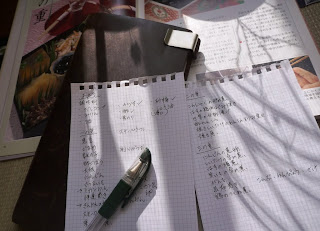Dusting the shelves and cupboard, scrubbing the refrigerator and stove, polishing plates, cups, glasses and cutlery. As I clean, I cleanse my mind, and my appreciation for everything that kept me alive throughout the year grows. People, events, nature, books, encounters…I stand in the kitchen preparing Osechi (festive food for the New Year) and cast my mind over 2009.
The word Osechi was shortened from Osechiku – the food offered to Gods at the five seasonal festivals a year. Nowadays, Osechi is regarded as exclusively being for the New Year. People believed that they ate food remaining from the festive enjoyment of the Gods, so all the dishes are prepared to be eaten cold.
I prepared twenty items this year. Each item has a meaningful origin. Here are some examples:
Kuromame (black soya beans) – mame (beans) means ‘diligence’. Work diligently and stay healthy.
Tatsukuri (fried sardines) – tatsukuri literary translates as ‘cultivating the rice paddy’ and therefore signifies fertility and good harvest.
Kobumaki (rolled kelp with fish) – kobu comes from the word yorokobu (to be pleased). This signifies the desire to live happily.
Satoimo (taro) – the potato’s soft round shape indicates harmony.
Kazunoko (herring roe) – the abundant multitude of fish eggs means limitless prosperity.
Preparing meals always reminds me of my mother’s cooking. I started making Osechi three years ago in order to pass on my family’s tastes to the next generation. Besides this, I find the intensive three days of cooking to be relaxing, so enjoy the preparation process in itself. Most Osechi comprises ordinary vegetables easily found in any farms nearby, such as carrots, beans, radishes, and potatoes. Sadly, my Shizen-nou allotment contributed very few items this year. This is due to: a) inability to grow sizeable vegetables harvested this time of year; b) everything already having been eaten. Therefore, my New Year’s resolution shall be – add at least five more vegetables to the next year’s Osechi. Hopefully in five years’ time, when the soil becomes more fertile, all the vegetables will be Shizen-nou. Five years also allows me to improve my cooking sensibility and skills to the extent that I can bring out the best vegetable flavor.
Anyway, thank you everyone for your warm support throughout the year and very best wishes to all.
Planning Osechi 計画を練らないと、、、。
台所に立つ
食器棚の埃を掃う。冷蔵庫やレンジの汚れを落とす。食器、茶碗、コップ、ナイフやフォークを磨く。家の大掃除をしながら、心の汚れも一緒に落としていきます。すると、今年一年私を生かしてくれた様々なものへの感謝の気持ちがじわじわとわいてきます。人々、事柄、自然、本、出会い、、、。台所に立ち、お節料理を作りながら、2009年をゆっくりと振り返ります。
お節は「お節供(おせちく)」が略された言葉で、本来は五節句ごとに神前に供えた食べ物のことを指したそうです。今ではお正月の料理をお節と呼ぶようになりました。神前に供えた後、神様のお下がりをいただくという意味で、冷えても美味しいものばかりで作られます。
今年は、20品目を作りました。ひとつひとつに自然の恵みに感謝する気持ちが込められています。下記、代表的なものを挙げてみました。
黒豆 - まめに働き、達者で。
田作り(ごまめ) - 田んぼを作る。豊穣豊作。
昆布巻き - よろこぶ。喜んで生きる。
里芋 - 円やかに角なく。調和。
数の子 - 数限りなく子孫繁栄。
お節料理をつくる時に思い出すのは、母の味です。祖母から母へと受け継がれてきた家庭の味を、私も次の世代へ伝えたいという思いで、3年前からお節づくりを始めました。この他、3日間に渡り料理を作り続けるという作業自体が、単純に落ち着くからという理由もあります。各々の段階を楽しみながらお節料理に取り組んでいます。
お節に使われる野菜は、普段その辺りの畑で手に入るような、人参、大豆、蕪、芋といったものが主体です。悲しいことに、私の自然農の畑からはほんの少しの野菜しか登場していません。この理由は a) この季節に採れる形のととのった野菜が出来ていない。b) 既に食べてしまった。からだと考えられます。ですので来年の抱負は、何としても私の畑から後5種類の野菜をお節に起用するぞです。5年後には私の畑ももっと豊かになり、お節に使う野菜は全て自然農野菜となることを願います。5年という月日は、野菜本来の美味しさを余すことなく引き出せるような、繊細さと技術を身につけられる時間かもしれません。
何はともあれ、今年一年温かく見守ってくださった皆様に心よりお礼申し上げます。来年が皆様にとって良い年となりますように。








2 comments:
I've found your blog via some other sites as I've been recently reading up on Japanese countryside living.
It's good to see this thing starting up in Japan now.
Interesting to see you live in Kita-Senju. My wife (Japanese) and I used in Matsudo near by (2004-2006).
We came back to the UK because of the perceived advantages for a more simple, country type life. (I'm into Peak Oil theory) However, I'm not so convinced anymore and Japan has some advantages over the UK.
Dear Gavin-san,
Thanks for the comment. I visited your blog. I wasn't familiar with the term 'peak oil' but energy including human labour is always the key concern in my life. (I am leaving Kitasenju soon to take more advantage of countryside living.)
I am not sure which country offers the better countryside life style, but for me, the most important factor would be the crops I could grow.
All my friends know how much I enjoy wine, cheeze, olives...but my body recently began to react in strange ways. (I really should learn the limit.) My body has been shaped to suit the Japanese climate/food, something I learned only after living overseas for 10 years.
Post a Comment